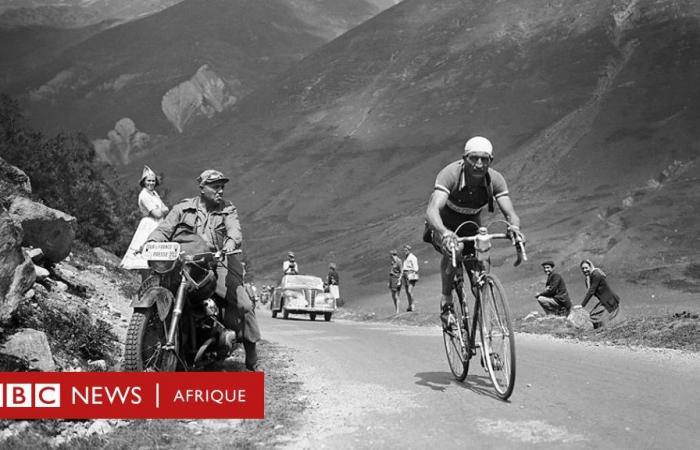Photo credit, Getty Images
- Author, Par Amy McPherson
- Role, BBC Travel
-
an hour ago
This year, the Tour de France starts in Florence and it’s the perfect opportunity to celebrate the city’s cycling hero: Gino Bartali, two-time winner of the Tour de France.
Piazzale Michelangelo, nicknamed “the balcony of Florence” because of the breathtaking views it offers of the Tuscan capital from its vantage point just above the Arno River, will take centre stage during the Tour de France Grand Départ on 29 June. It is here that the elite cycling teams will be presented to the masses of fans before the race officially starts from Piazza della Signoria in the city’s historic centre.
This is the first start of the Tour from Italy, and the local population is eagerly awaiting the start. For cycling-mad Italy, which has just hosted the Giro d’Italia, this is truly an occasion to be proud of.
“I am very excited about the big start in Florence and I think that the Tour de France could only start from here and from the beauty of Tuscany, a true land of cycling,” said Silvia Livoni, cycle tourism consultant for the Tuscany tourism agency, Toscana Promozione Turistica.
And for Florence, it is the perfect opportunity to celebrate its own cycling hero, Gino Bartali, three-time winner of the Giro d’Italia and two-time winner of the Tour de France, who is also officially honoured as part of the promotion of the Tour.
Born in 1914 in Ponte a Ema, a small town near Florence, Bartali became one of the greatest cyclists in history. As a child, Bartali would go to Piazzale Michelangelo with his brother Giulio to admire the magnificent domes of Florence, dreaming of one day becoming a great cyclist. Little did the little boy know at the time that he would be remembered not only as one of the best, but also as something much greater.
When he died in 2000, the Guardian described him as “the icon of Italian cycling” and focused its obituary on his cycling prowess and achievements.
Photo credit, Gino Bartali Cycling Museum
What the obituary does not mention, nor do other media outlets of the time, is the secret life Bartali led during World War II, when he risked his own safety to save the lives of persecuted Jews and dissident refugees.
Between 1943 and 1945, as part of a clandestine religious network, Bartali travelled thousands of kilometres by bicycle to deliver false identity documents printed clandestinely by an underground movement led by his friend the Archbishop of Florence, Cardinal Dalla Costa.
These documents were given to Jewish and other political refugees to help them escape Nazi-controlled northern Italy. Donning his racing jersey with his name printed on the back and leaving his home with only emergency tools for the bike, he traveled thousands of miles from Florence to Genoa and Assisi carrying this precious cargo.
Through this act alone, he is credited with saving the lives of more than 500 people.
For Bartali, his status as a cycling champion was the ultimate disguise. When he was stopped on the road, he would simply say, “I’m training,” and no one would question him further.
Bartali was fighting the regime that had initially used his cycling for political gain. His victory in the 1938 Tour de France was used as propaganda by the Italian fascist regime to “prove” the power of the Italian race, and his bicycle became his weapon of defiance against a government he did not support – particularly when Italy introduced a racial policy that year to exclude Jews from school and employment. When Italian dictator Benito Mussolini congratulated him on his victory, Bartali chose not to respond and dedicated his victory to the Catholic Church.
Photo credit, Gino Bartali Cycling Museum
When World War II broke out, the Italian fascist regime allied itself with Nazi Germany and began implementing the arrest of Jews in Italy. Partisan rebels were particularly numerous in Tuscany, as the region lay on the edge of the Allied advance from the south and the German advance from the north. Like many Tuscans opposed to the policy of the racial ideal, Bartali had the opportunity to help.
Travelers can see evidence of this at the Terontola train station, about 110 km south of Florence, where a plaque is dedicated to Bartali. In addition to his role as a courier, Bartali’s champion status allowed him to work with partisans to create a paparazzi scenario that diverted soldiers and guards from train carriages so that refugees could board and hide until the train reached the free south.
Yet he kept this life secret for most of his life after the war. Bartali believed that by talking about his good deeds he was betraying the people he had helped, as it became an act of self-promotion rather than sincere intentions.
“He never told anyone but me, making me swear not to tell anyone,” recalls Gino’s son Andrea in the film My Italian Secret (2014), a documentary about the bravery of unsung heroes during the war. Andrea was already in his thirties and, apart from those directly involved, he was the first person to whom Bartali told what exactly had happened during the war.
Photo credit, Getty Images
After Bartali’s death in 2000, his story was gradually revealed by his son, his friends and those he had helped, including Giorgio Goldenberg, whom Bartali had hidden in his cellar to escape capture as a child with his family. Since then, books and films have been made to tell Bartali’s story, as well as a West End musical that ran for a season in London in 2023.
Gino did not consider himself a hero, Andrea explains in the film, recalling his father’s words: “I want to be remembered for my sporting achievements. The real heroes are the others, those who have suffered in their soul, in their heart, in their mind, for their loved ones. They are the real heroes. I am just a cyclist.”
Maurizio Bresci, president of the Gino Bartali Cycling Museum, recalls that his father, Andrea Bresci, who was a friend of Bartali, first raised the idea of opening a museum in Bartali’s honor in 1986. “At first, Gino didn’t agree with the idea,” Maurizio told me. The idea was well received at the time by Bartali’s friends and family, the media, and the public, but it took some convincing for the great cyclist. Gino eventually said, “Okay, but it has to be a cycling museum for all cyclists, not just for me.”
The museum opened in 2006 in Ponte a Ema and displays newspaper clippings, athletes’ cards, personal documents, bicycles, photographs and the 1948 Tour de France trophy, which Bartali himself donated to the museum. When Andrea died in 2020, Maurizio took over as president of the museum and continued his father’s work to preserve Bartali’s history. With limited manpower and funds, the museum is still a work in progress. “This is my life, my passion,” Maurizio said, “to keep Gino’s story alive.”
Photo credit, Getty Images
Bartali’s story will be in the international spotlight when cycling’s Grand Prix passes through Ponte a Ema on June 29. For the Tour de France, Bartali is the iron cyclist who won the race twice, once before and once after World War II, both at the height of political unrest. The 10-year gap between his victories is a record no one else has achieved.
“I believe that the Great Departure from Florence is significant not only for Florentines but for all Tuscans and Italians and for the whole world – Silvia Livioni
It should be an exciting time for the museum, but for political reasons the Tour does not promote Bartali’s rescue work, focusing solely on his cycling exploits. However, it is clear that Tuscany is extremely proud of its champion, and locals hope tourists will stop to learn how Bartali’s selfless actions changed the lives of so many.
“I believe that the Grand Departure of Florence is important not only for Florentines, but also for all Tuscans and Italians and for the whole world,” said Mr. Livoni, “and it is right to dedicate it to Bartali, to tell his story today so that people understand his human depth. I hope that his story will inspire people to stand up for what they believe in, even when it is difficult.”






